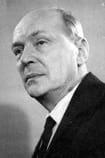

Mikhail Volpin
Mikhail Davydovich Volpin (December 28, 1902, Mogilyov - July 21, 1988, Moscow) - Soviet playwright, poet and screenwriter. Winner of the Stalin Prize of the second degree (1951). Mikhail Volpin was born in the family of David Samuilovich Volpin (1864, Mogilyov - 1937, Moscow), a lawyer of Jewish origin [2], and music teacher Anna Borisovna Volpina (nee Zhislin) (1875, Cherikov - 1963, Moscow) [3]. He spent his childhood years in Moscow, was fond of art, took drawing lessons from the artist Vasily Surikov. Accepted the ideas of the October Revolution, the young men participated in the Civil War on the side of Soviet power. In 1920-1921, as an artist and author of satirical texts, he came to work in the Window of Growth under the direction of Vladimir Mayakovsky. In 1921–1927 he studied at VHUTEMAS, wrote satirical poems, as well as comic plays, including in collaboration with Viktor Ardov, Ilya Ilf, Yevgeny Petrov, Valentin Kataev, Mikhail Glushkov, Vladimir Mass and Nikolai Erdman. As a poet, he collaborated in satirical journals in the early 1930s - a staff member of the magazine "Crocodile". Arrested OGPU October 27, 1933. The reason for the arrest was the information that he was writing anti-Soviet satirical works. In addition, at the disposal of the OGPU were data that Volpin - in the presence of third parties - "half joking, half seriously" announced his intention to "kill Stalin." He was accused of two points of Article 58 of the Criminal Code of the Russian Federation: 58-8, “of committing terrorist acts”, and 58-10 - “anti-Soviet agitation and propaganda”. However, article 58-8 was excluded from the text of the sentence. By a decree of the OGPU Collegium of January 16, 1934, he was sentenced to 5 years in a forced labor camp. The punishment was serving in Ukhtpechlag. Released in March 1937 "by counting working days." After his release, he met again with Erdman, with whom for more than 30 years he has been creating screenplays for films that have received the well-deserved recognition of the audience, mainly for fairy-tale films. Volpin took part in the filming of several films as a screenwriter, author of poems and lyrics (including the musical comedies Volga, Volga and Kuban Cossacks). Duo Volpin-Erdman (Volpin - poems, Erdman - prose) belongs to the Russian text of Strauss operetta “The Bat”, which served as the literary basis for the film adaptation. The outbreak of World War II caught Volpina in Ryazan. Together with Erdman he reached Stavropol, where both voluntarily joined the Red Army. From August 1941 a fighter of the sapper battalion of the engineering brigade of the 7th sapper army. In March 1942, the artists were sent to Moscow and until the end of the war they served in the Song and Dance Ensemble at the central club of the NKVD of the USSR, where they wrote military-patriotic plays and scenarios of theatrical performances with which the ensemble performed. In the postwar years, Volpin came to the Soyuzmultfilm studio, where in 1948 the first film was filmed according to his script, Fedya Zaytsev. Mikhail Volpin died in a car accident. He was buried at site 27 Vvedensky cemetery.
Read more